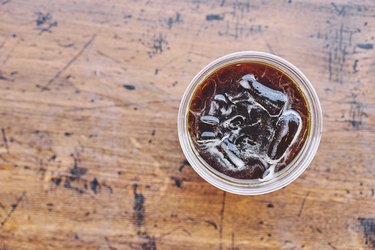
Caffeine is a central nervous system stimulant that gives people an extra boost of energy when they need it most. If you're sensitive to it, consider switching to caffeine-free soda. It tastes just like the real thing, but it doesn't give you the jitters.
Tip
If you experience any side effects from caffeine, it may be time to switch to decaf drinks. Luckily, there are many options, ranging from decaffeinated coffee to caffeine-free fizzy drinks.
Video of the Day
What Is Caffeine?
According to the U.S. National Library of Medicine, caffeine is a bitter substance that naturally occurs in over 60 plant species, including coffee beans, tea leaves, kola nuts and cocoa pods. Synthetic caffeine is used in some medicines like pain relievers and cold medicines as well as soda and energy drinks.
Video of the Day
Many packaged foods and beverages list the amount of caffeine on the label. The U.S. Food and Drug Administration states that for healthy adults, 400 milligrams of caffeine (four or five cups of coffee) per day is unlikely to cause any adverse effects. Certain populations, including pregnant people, people with mental illnesses and those on certain medications, are more vulnerable to caffeine's effects and should consume it with caution.
If you're drinking more than 400 milligrams a day, the Mayo Clinic states you might experience some uncomfortable side effects like:
- Migraine or headache
- Insomnia
- Jitters
- Anxiousness
- Nausea
- Unusual bowel movements
- Fast heart rate
Read more: Long-Term Effects of Caffeine
Caffeine in Soft Drinks
It's relatively easy to consume a few servings of soda or energy drinks per day without realizing it. These drinks typically have low nutritional value and are high in calories and sugar. They are also harmful to your teeth. A small study published in the Journal of Caffeine Research in September 2013 indicates that soft drinks containing caffeine are associated with more aggressive forms of dental decay.
Naturally extracted caffeine comes from coffee beans. However, most of the caffeine in soft drinks is synthetically produced in Chinese pharmaceutical plants. The Center for Science in the Public Interest lists popular soft drinks as:
- Pepsi Zero-Sugar (20 ounces): 115 milligrams of caffeine
- Mountain Dew (20 ounces): 91 milligrams of caffeine
- Diet Coke (20 ounces): 76 milligrams of caffeine
- Coca Cola (16 ounces): 45 milligrams of caffeine
- Sunkist Orange Soda (20 ounces): 31 milligrams of caffeine
- Dr. Pepper (8 ounces): 28 milligrams of caffeine
Read more: The Top 10 Worst Soft Drinks For Your Health
Caffeine-Free Soda
If you experience any negative side effects from caffeine, it may be time to cut back and talk to your doctor. Remember that caffeine is a drug, so you may go through withdrawals. It's important to cut back slowly rather than all at once to avoid any withdrawal symptoms.
Caffeine-free soda or other caffeine-free fizzy drinks can be an option for those who are not ready to quit soft drinks. Here are some beverages to consider:
- Caffeine-Free Coca Cola (12 ounces): 140 calories
- Caffeine Free Diet Coke (12 ounces): 0 calories
- Seagrams Ginger Ale (12 ounces): 130 calories
- Sprite (12 ounces): 140 calories
- Cranberry Bubbly Sparkling Water (12 ounces): 0 calories
If you're cutting back on caffeine and switching over to caffeine-free soda, you may start feeling a little drowsy. This is a common side effect of caffeine withdrawal. To regain your energy, try going to sleep a little earlier than you normally would. Additionally, morning exercise can give you the adrenaline boost you need to get through the day without caffeine.
- U.S. National Library of Medicine: "Caffeine"
- The U.S. Food and Drug Administration: "Spilling the Beans: How Much Caffeine is Too Much?"
- U.S. National Library of Medicine: "Calorie Count - Sodas and Energy Drinks"
- US National Library of Medicine National Institutes of Health: "Effect of Caffeinated Soft Drinks on Salivary Flow"
- The Coca Cola Co. USA Product Facts: "Caffeine Free Coca-Cola, Original 12 fl oz"
- Center for Science in the Public Interest: "Caffeine Chart"
- The Coca Cola CO. USA Product Facts: "Caffeine Free Diet Coke, Original 12 fl oz"
- The Coca Cola Co. USA Product Facts: "Seagram's Ginger Ale, Original 12 fl oz"
- The Coca Cola Co. USA Product Facts: "Sprite, Original 12 fl oz"
- Pepsico: "Bubly Sparkling Water - Cranberry"
- Mayo Clinic: "Caffeine: How much is too much?"
- Colorado University: "Are We Over-Caffeinated?"